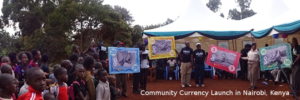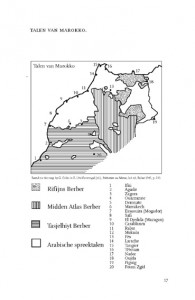Ikkattinn – Berberse volksverhalen uit Zuid-Marokko
In Noord-Afrika worden van oudsher Berberse talen gesproken. De geschiedenis leert ons dat het altijd al een gebied is geweest waar verschillende culturen elkaar hebben ontmoet en waar verschillende talen naast elkaar hebben bestaan.
Zo werd er tijdens de Romeinse overheersing van Noord-Afrika (van de tweede eeuw voor Christus tot de zesde eeuw na Christus), naast genoemde Berberse talen, Latijn en Punisch gesproken. In het begin van de achtste eeuw na Christus begon de islam zich over Noord-Afrika uit te breiden en dat bracht een verspreiding van Arabische spreektalen met zich mee. Dit proces verliep in het ene gebied langzamer dan in het andere. Zo was waarschijnlijk de overgrote meerderheid van de Marokkaanse bevolking tot ver in de 19e eeuw Berbertalig. In Marokko werden tijdens de periode van koloniale overheersing (1912-1956) Frans en Spaans aan de reeds aanwezige talen toegevoegd.
“In negen landen van Noord-Afrika worden tegenwoordig Berberse talen gesproken. Het totale aantal sprekers is ongeveer vijfentwintig miljoen. We onderscheiden acht à tien verschillende Berberse talen die weliswaar taalkundig sterk verwant, maar in praktijk in wisselende mate onderling verstaanbaar zijn. Als taalfamilie behoren Berberse talen bij het Afroaziatisch”.
Verreweg de meeste Berbertaligen vinden we in Marokko, een land met 30 miljoen inwoners. Naar schatting de helft van de Marokkanen spreekt van huis uit een van de drie Marokkaanse Berberse talen (voor de geografische verspreiding zie het kaartje): Rifijns Berber (Tarifiyt) in het noorden, met ongeveer twee miljoen sprekers; Midden-Atlas Berber (Tamazight) in het midden, met ongeveer vier miljoen sprekers en Tasjelhiyt Berber (Tasjelhiyt of Tasusiyt) in het zuiden, met ongeveer negen miljoen sprekers.
Veel Berbertaligen zijn uit hun oorspronkelijke woongebied geëmigreerd, zowel naar gebieden binnen hun eigen vaderland als naar andere landen. De grootste stad van Marokko, Casablanca, is voor zestig procent Berbertalig; één op de twaalf inwoners van Parijs spreekt een Berberse taal.
Als gevolg van arbeidsmigratie vanuit Marokko, vanaf de jaren zeventig van de vorige eeuw, hebben zich in Nederland veel Marokkanen gevestigd. Thans, 2005, wonen er ongeveer 300.000 Marokkanen in Nederland. Hiervan is driekwart Berbertalig, dus ongeveer 220.000 mensen, waarvan waarschijnlijk 180.000 Rifberbers en 40.000 Berbertaligen uit de Midden-Atlas en Zuid-Marokko.
Het Tasjelhiyt Berber van Zuid-Marokko is naar aantal sprekers de grootste Berberse taal van Marokko. De noordelijke grens van het Tasjelhiyt Berber-taalgebied wordt gevormd door de noordelijke rand van de Hoge-Atlas; de zuidelijke grens is de denkbeeldige lijn van Foum Zguid, een plaats ten zuiden van Ouarzazate, in het oosten, tot het plaatsje Ifni aan de kust in het westen. De oostelijke grens is de denkbeeldige lijn van Demnate, over Ouarzazate naar Foum Zguid. De westelijke grens is de kust van de Atlantische oceaan, tussen de steden Essaouira en Ifni. Ten zuiden van de stad Demnate gaat het Tasjelhiyt Berber geleidelijk over in het Berber van de Midden-Atlas.
as-Sûs al-Aqsâ
Het Tasjelhiyt Berberse taalgebied, dat in oppervlakte ongeveer vier keer zo groot is als Nederland, was bij de oude Arabische geografen en historici bekend als as-Sûs al-Aqsâ “de verafgelegen Sous”. De Sous is de naam van de grote vlakte ten oosten van Agadir. Vandaar dat het Tasjelhiyt Berber ook wel Sous Berber wordt genoemd. In Franstalige werken noemt men deze taal gewoonlijk “Chleuh” of “Tachelhiyt”. Read more
The Open Library of Humanities
 The Open Library of Humanities (OLH) is a charitable organisation dedicated to publishing open access scholarship with no author-facing article processing charges (APCs). We are funded by an international consortium of libraries who have joined us in our mission to make scholarly publishing fairer, more accessible, and rigorously preserved for the digital future.
The Open Library of Humanities (OLH) is a charitable organisation dedicated to publishing open access scholarship with no author-facing article processing charges (APCs). We are funded by an international consortium of libraries who have joined us in our mission to make scholarly publishing fairer, more accessible, and rigorously preserved for the digital future.
The OLH publishing platform supports academic journals from across the humanities disciplines, as well as hosting its own multidisciplinary journal. Launched as an international network of scholars, librarians, programmers and publishers in January 2013, the OLH has received two substantial grants from the Andrew W. Mellon Foundation to date, and has built a sustainable business model with its partner libraries.
All of our academic articles are subject to rigorous peer review and the scholarship we publish showcases some of the most dynamic research taking place in the humanities disciplines today – from classics, modern languages and cultures, philosophy, theology and history, to political theory, sociology, anthropology, film and new media studies, and digital humanities. Our articles benefit from the latest advances in online journal publishing – with high-quality presentation, annotative functionality, robust digital preservation, strong discoverability and easy-to-share social media buttons.
Our mission is to support and extend open access to scholarship in the humanities – for free, for everyone, for ever.
Go to: https://www.openlibhums.org/
Report: St. Ann’s ~ Thames ~ 1969 ~ Nottingham Slums
Thames TV’s 1969 documentary on Nottingham’s slums, introduced here by Ray Gosling in 1993.
Grassroots Economics Kenya ~ Community-Currencies
 Grassroots Economics is a non-profit foundation that seeks to empower marginalized communities to take charge of their own livelihoods and economic future. We focus on community development through economic empowerment and community currency programs. Beneficiaries of our programs include small businesses and people living in informal settlements as well as rural areas. GE is proud to have a rich history in community development programs thanks to it’s many partners.
Grassroots Economics is a non-profit foundation that seeks to empower marginalized communities to take charge of their own livelihoods and economic future. We focus on community development through economic empowerment and community currency programs. Beneficiaries of our programs include small businesses and people living in informal settlements as well as rural areas. GE is proud to have a rich history in community development programs thanks to it’s many partners.
Our goal is to improve the lives of those who are most vulnerable. We use approaches such as participatory education and in-depth research and community profiling to understand needs and design programs with meaningful impacts.
In 2010, we began the first pilot programs in Mombasa and Nairobi, which were awarded as one of the top innovations in Africa at the Forum Afrique in Paris. Thus far, our community currency programs have been supported by organizations in France, Switzerland, the United Kingdom, Germany, Netherlands, Australia, South Africa, and the United States.
Over the last two years, GE (formerly known as Koru-Kenya) has grown tremendously in the number of people we serve and the expansion of our currency programs. At this point we are close to our maximum programming capacity, with nearly all of our programs and services fully booked through the end of this year. Yet demand continues to grow. After winning a precedent setting court case, community currencies were deemed legal by the Director of Public Prosecutions and the groundwork has been created to expand these currencies wherever communities are unable to access the national currency.
—
COMMUNITY CURRENCY
A community currency is a regionally based means of exchange that does not replace but rather supplements the national currency system. Through increasing trade by matching unmet local needs with under utilized local resources, community currencies enable sustainable environmental and social development programs. Community Currencies are distinct from the wider field of financial innovations because they are set up with the asset and productive capacity backing of the communities that will ultimately use them.
Read more: http://www.grassrootseconomics.org/community-currencies
EuroMemo Group ~ The European Union: The Threat Of Disintegration
![]()
Introduction
The crisis of the European Union (EU) is multifaceted and has visibly deepened during the last year. The British referendum on EU membership and the vote in favour of Brexit have only been the most explicit symptom of the disintegrative tendencies. The core-periphery rift in the euro area has continued. The arrival of a large number of refugees from the war-torn areas of the Middle East has resulted in acrimonious conflicts in the EU on the question who should take care of them. The way in which the pro-free trade forces pushed through the Comprehensive Economic and Trade Agreement (CETA) with Canada showed utter disregard for the objections of democratically elected bodies (e.g. the Belgian regions of Wallonia and Brussels).
In face of the multiple crisis of the EU, there is a relatively large consensus ranging from Social Democrats to right-wing nationalist forces to seek a flight forward towards an increasing militarisation of the EU. Otherwise, different strategies to deal with the crises can be discerned. The predominant response is muddling through. It is privileged by the majority of Christian Democrat, Social Democrat and liberal forces. This strategy continues the neoliberal mode of integration and seeks to preserve the present geographic shape of the euro area and the Schengen Zone. It will most probably not prevent the deepening of the disintegration tendencies. There are two sub-varieties of muddling through. One aims to combine it with more fiscal flexibility and more public investment. It is mainly advocated by Social Democrat forces in France and the Mediterranean. The other subvariety abandons the integrity of the Schengen Zone and rather advocates a smaller Schengen Zone with tighter border controls. It is favoured by a relatively broad range of forces particularly in Germany, Austria and Central Eastern Europe. A ‘core Europe’ conception with a smaller and more compact euro area is advocated by right-wing nationalist forces like Lega Nord in Italy, Freiheitliche Partei Österreichs (FPÖ) in Austria and Alternative für Deutschland (AfD) in Germany as well as some Christian Democrat currents. On the right of the political spectrum, there are finally ‘Europe of Nations’ concepts. They tend to advocate focusing European integration on the Single Market and linked economic regulations. The nationalist right-wing demands more spaces of national competitive strategies. Right-wing nationalist parties, like Fidesz in Hungary and Prawo i Sprawiedliwość (PiS) in Poland, regard regional funds as an essential element of integration. Some forces of the nationalist right even tend towards leaving the EU.
On the political left, there are divergent strategies as well. Some forces advocate a form of democratic European federalism. The political presuppositions of such a project are extremely demanding. Other left-wing forces do not regard democratic European federalism as a realist solution and see the EU institutions as being particularly strongly shielded against popular pressures. They propose an explicitly pro-social agenda and defying EU regulations and abandoning the euro area if this is necessary to bring about progressive policy changes. Read more
Europäische Ökonomen sehen ernste Gefahren für die europäische Integration
![]() For the complete text – in English – go to (PDF): The European Union: The Threat Of Disintegration
For the complete text – in English – go to (PDF): The European Union: The Threat Of Disintegration
Die Arbeitsgruppe Europäische Wirtschaftswissen schaftlerInnen für eine andere Wirtschaftspolitik in Europa (EuroMemo Group) veröffentlicht am Dienstag, den 24. Januar 2017, das EuroMemorandum 2017 “The European Union: The Threat of Disintegration.” 270 Ökonomen und Sozialwissenschaftler aus ganz Europa fordern darin gemeinsam einen radikalen Kurswechsel in der europäischen Wirtschafts- und Sozialpolitik.
Das EuroMemorandum 2017 offenbart ernste Gefahren für die Integration Europas: Die Polarisierung zwischen den europäischen Kernländern und der Peripherie hält an. Der Umgang mit der großen Zahl an Flüchtlingen hat zu erbitterten Konflikten innerhalb der EU geführt und die Durchsetzung des europäisch-kanadischen Freihandelsabkommens CETA machte eine völlige Gleichgültigkeit gegenüber Einwänden von demokratisch gewählten Organen deutlich. Der Brexit war nur das klarste Zeichen der Gefahren für die europäische Integration.
Die wirtschaftlichen Aussichten Europas sind weiterhin düster: Während sich die Eurozone noch lange nicht nachhaltig erholt hat, erhöhen die nachlassende weltweite Konjunktur und der Brexit die Unsicherheit noch mehr. Die zaghaften Bestrebungen der EU-Politik wie der Juncker Plan und der etwas größere fiskalpolitische Spielraum für die Mitgliedsstaaten sind bei weitem nicht ausreichend. Das EuroMemorandum 2017 fordert eine koordinierte Wirtschaftspolitik, die statt auf ausgeglichene Haushalte auf eine ausgeglichene Volkswirtschaft mit hoher Beschäftigung und den Abbau von regionalen Ungleichheiten setzt. Eine effektive Fiskalpolitik auf EU-Ebene, die in der Lage ist, Abschwünge auf EU-, nationaler und regionaler Ebene zu bremsen, und eine langfristige Investitionsstrategie sind notwendig. Strategische Lohnzuwächse würden eine gerechte Teilhabe der Arbeiter am Wachstum und stabile Inflationsraten ermöglichen. Dem Steuerwettbewerb muss eine Ende bereitet werden.
Zwar haben die deutliche Niedrigzinspolitik und die unkonventionellen geldpolitischen Maßnahmen der EZB angesichts der restriktiven Fiskalpolitik höchstwahrscheinlich einen vollkommen wirtschaftlichen Zusammenbruch infolge der Finanzkrise verhindert, doch stößt diese Politik zunehmend an ihre Grenzen. Auch ist die geplante Kapitalmarktunion kaum in der Lage, einen maßgeblichen wirtschaftlichen Anstoß zu geben und gerät infolge des Brexit ins Ungewisse, da die britischen Finanzmärkte ganz klar als Zentrum des Wertpapierhandels vorgesehen waren. Unter Vorraussetzung einer koordinierten expansiven Fiskal- und Investitionspolitik fordert das EuroMemorandum 2017 daher eine “Normalisierung” der Geldpolitik mit niedrigen, aber positiven Zinsraten.
Auch im Hinblick auf die Flüchtlingsmigration zeigt das EuroMemorandum 2017 auf, dass der Druck auf die gesellschaftlichen Ressourcen vielmehr auf die jahrelang vernachlässigte staatliche Grundversorgung in den EU-Ländern zurückzuführen ist. Finanzierungsmodelle für die Integration von Flüchtlingen und EU-Migranten, die gleichzeitig den Volkswirtschaften der Zielländer zugutekommen, sind ganz klar möglich. Das Solidaritätsprinzip innerhalb der EU bietet eine Grundlage, um populistischen fremdenfeindlichen Positionen zu begegnen.
Die Krise der EU begünstigte den Anstieg rechtsorientierter Kräfte in Europa, die sich vom nationalliberal-konservativen bis ins faschistische Spektrum erstrecken. Wirtschaftspolitisch sind die Programme der jeweiligen Parteien eher neoliberal, teilweise in Verbindung mit national-konservativen und auch heterodoxen Elementen, ausgerichtet. Klar ist die Präferenz nationaler gegenüber europäischer Lösungen. Im Zentrum der Forderungen des EuroMemorandums 2017 stehen vielmehr inklusive Reformen, die soziale und wirtschaftliche Ungleichheiten abbauen. Der territoriale Rahmen ist dabei nicht Ausgangspunkt und sollte danach bestimmt werden, wo die größten Erfolgschancen sind. In der Tat ist dies oft eher die nationale als die EU-Ebene. Angesichts der strikten institutionellen Beschränkungen innerhalb der Eurozone, müssen auch Austrittsstrategien erwogen werden.
Während die Verhandlungen zum transatlantischen Freihandelsabkommen TTIP zeitweise ausgesetzt wurden, geriet das europäisch-kanadischen Freihandelsabkommen CETA ins Zentrum der Aufmerksamkeit. Doch ist CETA im Hinblick auf Demokratie und Rechtsstaatlichkeit genauso rückschrittlich wie TTIP. Auf Ebene der Mitgliedsstaaten sollte versucht werden, die noch ausstehende Ratifizierung von CETA durch die nationalen Parlamente zu verhindern. Im Hinblick auf die Europäische Nachbarschaftspolitik sollten statt weitreichendem Freihandel, untergeordneter Integration und Militarisierung, beiderseitig vorteilhafte Kooperationen zum Beispiel auf Branchenebene eingegangen werden.
Das EuroMemorandum ist eine jährlich erscheinende Publikation der EuroMemo Group, in der aktuelle wirtschaftliche Entwicklungen in Europa kritisch analysiert und Alternativen aufgezeigt werden. Die EuroMemo Group ist ein Netzwerk von Ökonomen aus ganz Europa mit dem Ziel, darzustellen, dass es eine wirtschaftlich nachhaltige und sozial gerechtere Alternative zu neoliberalen Liberalisierungsmaßnahmen gibt.
Mehr Informationen über die EuroMemo Group finden Sie unter www.euromemo.eu
Kontakt
Stefanie Marie Scholz, M. Sc.
Koordination der EuroMemo Group
E-mail: info@euromemo.eu



